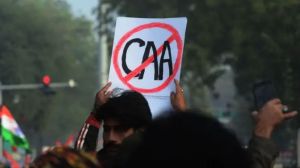Stay updated with the latest - Click here to follow us on Instagram
With Rs 3,951 crore in kitty,DJB pledges better services
With an eye on big investments in the sewerage network,as well as water and waste water treatment plants in the city,the Delhi Jal Board (DJB) on Thursday was allotted an additional Rs 150 crore when compared to last year.
With an eye on big investments in the sewerage network,as well as water and waste water treatment plants in the city,the Delhi Jal Board (DJB) on Thursday was allotted an additional Rs 150 crore when compared to last year. The Board approved the DJB Budget of Rs 3,951.78 crore,assigning Rs 1,869.35 crore in planned outlay and Rs 2,082.43 crore for non-planned works in 2013-14.
Of the Planned Budget,Rs 890.20 crore has been earmarked for the water sector,while Rs 774.80 crore has been put aside for sewerage.
In the water sector,the primary focus areas shall be extending the water network to planned and unplanned areas,minimising water leakages,full domestic metering and augmentation of production capacity. To provide sewerage systems to unauthorised colonies,drains will be laid in Mahavir Enclave,Kailashpuri Extension,Sagarpur,Durga Park,Pul Prahaladpur,Vishwakarma Colony,Lal Kuan,Maidangarhi,Saidulajab,Kardampuri,Kardampuri Extension,Harijan Basti and West Jyoti Nagar, the DJB said.
The 2013-14 Budget,which was presented to DJB chairperson and Chief Minister Sheila Dikshit by Jal Board CEO Debashree Mukherjee,has approved the construction of an underground reservoir and booster pumping station in Mangolpuri at a total cost of Rs 24 crore.
The work is likely to be completed in 18 months,and will benefit the residents of Sultanpuri resettlement colony and its adjoining areas, Mukherjee said.
Mukherjee also informed the Board about the DJBs preparedness to face the expected increase in water demand in the approaching summer,while still banking on the construction of Munak Canal for augmentation of potable water and facilitating commissioning of three newly constructed water treatment plants (WTP) at Dwarka,Okhla and Bawana.
The past five years have seen the Munak Canal project hanging fire despite completion,as it has now escalated to the level an inter-state dispute between Delhi and Haryana,she said.
The Munak Canal was constructed by Haryana with financial assistance of around Rs 400 crore from the Delhi government on the condition that the national capital would be supplied 80 MGD water from it.
Commenting on the issue after the board meeting,Dikshit said,I will seek Prime Minister Manmohan Singhs intervention in the Munak Canal issue as Haryana is not releasing water from the canal.
The CEO once again blamed the continual influx of migrants from neighbouring states and their demographic placement in the capital as the greatest challenge to providing water.
The DJB is currently producing 835 MGD of water to meet the demand of 18 million people in the city.
The Water Tariff has been rationalised by the board,which is aimed at reducing water losses along with water conservation efforts,which have in the last three years,enabled the DJB to meet its maintenance and operation costs, she said.
Mukherjee,however,said the DJBs net cash revenue surplus has increased in the last four years from Rs 40.56 crore in 2007-08 to an expected surplus of Rs 233.57 crore in 2013-14.
The government has approved financial assistance of Rs 1,665 crore. The project of modernisation of Chandrawal WTP and its command areas has been sanctioned. An amount of Rs 2,018 crore will be given to it under Japan International Cooperation Agency funding. Also,an additional Rs 1,896.35 crore has been received from JnNURM for STPs and interceptor sewers.
The DJB has 34 WTPS at 20 locations with an installed capacity of 544 MGD,which will be further increased to 628 MGD in 2013-14 after commissioning of Yamuna Vihar,Kondli,Kapashera and Chilla STPs.
Mukherjee also said that systemic improvements in the existing water supply systems for general distribution of potable water and to provide water to the urban poor in unauthorised colonies are being made.







